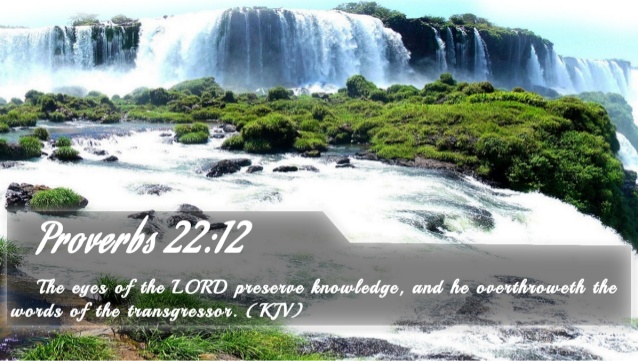God-given Words

 “The eyes of the Lord keep watch over knowledge, but he frustrates the words of the unfaithful,” Proverb 22:12.
“The eyes of the Lord keep watch over knowledge, but he frustrates the words of the unfaithful,” Proverb 22:12.
Let’s admit it. Have you ever felt frustrated, trying to find the right word as you talk with a friend or work on your manuscript? I sure have. It’s a part of the human condition, and there are scores of books dedicated to communicating with others productively and writing well.
But what about this scripture as it pertains to communicating well, whether verbally or in writing? The Lord watches over knowledge? What a thought!
Could this mean that all the knowledge that is already inside you—as it aligns with God’s word—is carefully and vigilantly cared for, even guarded by the spirit of God? That’s an empowering thought. All of the sermons you’ve heard, the scripture you’ve faithfully read, the Bible studies you’ve attended—all that biblical truth is safely tucked away in your heart and mind just waiting to be spoken or written? Can it be?
I think God honors faithfulness and just waits to take the power of His word, plop it on the page or put it in a conversation to bring life to those words, if only we would let Him. To think that He watches over all the knowledge we have and the words we speak or write just waiting to empower us to use them for His good—oh what a beautiful thought!
But when we’re trying to write or speak on our own, that’s when the frustration hits us. And ultimately, that’s His mercy. He wants us to use only that which gives life and breathes on the page or in a conversation.
Yet how often do we speak or write in our own strength and find ourselves at a lost for words, frustrated and dumbfounded? That’s when we need to return to the One who has the truth and knowledge and will fill us up so we can keep on going, not in our own strength but in His.
When have you felt God give you words? I’d love to know!
Measure Your Words

 “Do not be quick with your mouth, do not be hasty in your heart to utter anything before God. God is in heaven and you are on earth, so let your words be few,” Ecclesiastes 5:2.
“Do not be quick with your mouth, do not be hasty in your heart to utter anything before God. God is in heaven and you are on earth, so let your words be few,” Ecclesiastes 5:2.
This is a tough one, eh? How can we “let our words be few” in a world of blogs and Facebook posts and 24/7 social, visual, audio, and mass media? Are you kidding?
When novels are expected to be 100,000 words long, and you’re expected to have a sequel written instantly? Sounds impossible even as I sit here trying to write this blog and then revise my novel that needs another 30,000 words. How do I make those words matter in light of eternity and in the hearts and minds of those who will read them?
I think this scripture is talking about being hasty to utter (or write) things that God would not want to hear or read, about considering what we say or write and their implications on a deeper, more eternal level. If you gave God your blog or your book, or He sat in on your lunch conversation with your best friend, what would He think about the words that come out of your mouth or your fingers? Would He be blessed by your work or saddened at them? Scary thought, huh?
Would your suspense novel about the murder of a congressman and the revenge of her death promote life and truth or would it be something that takes away from it? If redemption is the main point, maybe. But if it’s just a fun, compelling read that’ll sell well, would it be something God would enjoy reading?
The truth is, God really does hear every word we speak or write. He knows what we say and read. He is the ultimate audience, judge, and jury, and He is merciful and kind. Yet the breadth and height and depth of the words we speak and write really do matter.
If we think of our speaking and writing that way, then we’ll measure our words more carefully, whether spoken or written, with the same measurement God does. Are they words you’d want God himself to hear or read?
Wow! That’s a tall order, and how do we get there? Philippians 4:8 gives us some good guidelines: whatever is true, whatever is noble, whatever is right, whatever is pure, whatever is lovely, whatever is admirable—if anything is excellent or praiseworthy—think (and then speak or write) about such things. Good advice, especially for today’s word-filled world.
How do you measure your words? I’d love to know!
Loving Words
“Do everything in love,” 1 Cor 16:13-14.
My precious husband, Dale, and I just celebrated our 12th wedding anniversary. What a joyful journey it’s been being married to a man who tries his best to do everything in love, even when it’s not that easy. It’s been a journey full of twists and turns, ups and downs, and it’s been the most wonderful years of my life. And the sweetest part of it all? Redemption has been the hallmark of our 12 years together.
We both try to “do everything in love”—especially to use loving words, even when we have disagreements or differences. It’s a choice we make every day, sometimes every moment, and that makes all the difference in the world. Because of these choices, our marriage has been a journey of peace, healing, and hope precisely because we choose to speak and do all we can through the purpose and plan to love one another. And even when we fail, when we get snippy, snarky, sarcastic, or short, we apologize and set our sights back on choosing love.
As with any relationship, it’s not always easy. At times we disagree on lots of things—what to eat and do, where we go and what we want, and countless other things. But in the midst of everything, we both choose to weigh our words and our wants. Will what I say or how I say it help or hurt our relationship? Does what we want really matter?
So how does this translate into every day life and in our writing life? I think it’s the same whether it’s about choosing loving words with your spouse, your kids, your friends, your foes, or in your writing for your readers. The answer is that we choose words that help and not hurt, that bring life and not death, that will bless and not curse.
When we speak, write, and interact with others, listen to that still small voice inside guiding you to button your lips or measure your words or have the right attitude. Sometimes it’s a stern warning bathed in love. Other times it’s a compassionate suggestion. Still other times, it’s telling a story that makes a point, just as Jesus told parables so often. Clothe your words in love. Speak them plainly. Share them abundantly. And show them fully. Love is a powerful language!
How do you speak the language of love? I’d like to know!
An Appropriately Paced Life

 “There is a time for everything, and a season for every activity under heaven,” Ecclesiastes 3:1.
“There is a time for everything, and a season for every activity under heaven,” Ecclesiastes 3:1.
After a busy conference season, two trips to New York, and a whirlwind trip around Ireland, I’m reevaluating the pace of my life, my priorities, and how I use my time. What’s really, really important? Yes, there are expectations, obligations, and demands that try to push and pull me in all kinds of directions, but what is an appropriately paced life?
While I know that my gifts will make space for me, there is a season for everything. Yet I also know that I need to manage that space. So what does that look like for me—and for you?
First, prayer, worship, and reading the Word needs to be the plumb line that will keep everything else in balance. When these get messed up, the pace of life simply gets out of whack. Right now, I need to adjust my schedule to allow more time for all three.
Second, I need to avoid unhealthy and unbalanced expectations. Moderation is key. I need to pace myself with work, play, relationships, exercise, and even my writing. I need to find the balance in all of it and reject the oppressive demands that weigh on me, whether that comes from inside myself or from others and remember that, ultimately, people and relationships are the most important.
Third, I need to preemptively replace guilt with peace, and for me, this is the hardest of all. I’m a perfectionist and ultra responsible, so I feel the pressures of the “should dos” and “must dos” way too much. So I must choose to rest in Him and trust Him with my days, weeks, months, and year, even when they don’t turn out the way I wished they would.
Recently, on top of all the busyness, health issues and family situations have pulled me away from my agenda, my to-do list, and my timelines. I have so much more that I’d like to do, see, and write than I can possibly get done. So I have to let some of them go and find peace and contentment with whatever the Lord allows.
And what about you? What advice to you have to create an appropriately paced life, find balance in this busy world, and enjoy the peace that comes with it? I’d love to know!
Instructive Words

 “Apply your heart to instruction and your ears to words of knowledge,” Proverb 23:12.
“Apply your heart to instruction and your ears to words of knowledge,” Proverb 23:12.
This morning I enjoyed watching robins searching our lush green grass for their breakfast. The bigger bird found a fat, juicy worm, pulled it out of the ground, and gave it to his mate. She, in turn, flew to her nest where, I suspect, her little ones were awaiting the meal.
In the past few months I’ve served on the faculty of several writers conferences, led workshops, taken lots of one-on-one appointments, and critiqued articles, book proposals, and blog ideas. I especially enjoyed meeting writers who apply their heart to instruction and want to gain all the knowledge they can—they are the most fruitful writers I meet and work with.
They’re like hungry birds, gobbling up every little worm of knowledge they can. It’s a joy to have them in my workshops. It’s inspiring to mentor them. It’s a pleasure to critique their work. It’s an honor to pass on any little bit of knowledge I can. I enjoy serving these new and seasoned writers, and I love connecting with the passion they have to touch the lives of others with God’s truth. As an added bonus, I always learn something from them, too.
But there are also those who think they know it all, who have a chip on their shoulder or an ax to grind, and their words reek with haughtiness, bitterness, or ignorance. One such writer came to one of my workshops and then cornered me at lunch. Later we had a critique time, and her writing was anything but knowledgeable, edifying, or biblical. She had gone through a divorce, and she was determined to let the whole world know that men were scum and that she had been mistreated. And to top it off, she seemed to be unteachable and was going to self-publish her work!
I gave her some pretty strong warnings about finding healing before she proceeded with publishing her venom. I cautioned her to be a life-giver not a life-taker with her writing. I prayed with her and felt her stiffen at my prayer. But then, a few weeks later, I got an email from her that revealed how God had used our meeting to reveal some things and to change her heart. She had bowed her knee, applied her heart to instruction, and bent her ears to words of knowledge.
It was a beautiful thing.
So as you journey through this life, listen when someone shares instruction or wisdom with you. You’re never too old, too wise, too polished or too popular to grow. I sure need—and welcome—the wisdom of others. How about you?
When have you been challenged to apply your heart to instruction and your ears to words of knowledge? I’d love to know!
Irish Eyes are Smiling

 A few weeks ago we toured Ireland, and I couldn’t help but think of Colossians 3:12, “clothe yourselves with compassion, kindness, humility, gentleness, and patience.” We found these virtues abundant in the bed and breakfasts, in the shops, or when navigating roundabouts, getting lost on narrow country roads, or taking a wrong turn in the cities. Oh that we would display such virtues more often in our own country!
A few weeks ago we toured Ireland, and I couldn’t help but think of Colossians 3:12, “clothe yourselves with compassion, kindness, humility, gentleness, and patience.” We found these virtues abundant in the bed and breakfasts, in the shops, or when navigating roundabouts, getting lost on narrow country roads, or taking a wrong turn in the cities. Oh that we would display such virtues more often in our own country!
It was refreshing to see that people weren’t in any hurry to get ahead. They sat in the pubs and town squares chatting and laughing and enjoying each other’s company. And they went out of their way to make us feel welcome wherever we were.
When we told folks we were going to Ireland, everyone who had been there said that the Irish people are the highlight of any trip to Ireland. “They’re the friendliest and most hospitable people on earth,” they said. We didn’t really know what that meant, but we soon found out that they were right. In our weeklong stay on the Emerald Isle, we met so many friendly people—and only met one grumpy salesclerk. Amazing!
The Irish happily give you directions, even lead the way if you’re lost, and the Irish B&B’s are the best ever. Even in stores or pubs, people are unpretentious and helpful, and good humor is their calling card. At our favorite B&B, the Eden Villa, our hosts were Peter and Mary Brennan who acclimated us to County Sligo with a video and afternoon tea before kindly sending us off to explore the area.
The Irish have survived Viking invasions, harsh and unfair British rule, the devastating famine of 1847-9, the War of Independence in 1918, and the Troubles of the 1970-90. Yet, after all those terrible and unforgivable injustices and difficulties, they aren’t “entitled” or bitter. Instead, the Irish are good, kind, positive people who have forgiven and moved on to be successful throughout the world.
What would our country and our world look like if more of us would employ such virtues in our lives? If we’d chat with our neighbors more often instead of driving into our garage and shutting the door? If we’d linger after church or offer to serve? If we’d be a little more patient in the lines at WalMart or in traffic? I must admit that the Irish gave me something to ponder—mixed with a bit of conviction.
In this uncivil society we live in, I’m grateful to be reminded that kindness, friendliness, hospitality, and patience truly are virtues to live by. Thanks, Ireland, for the friendly reminder.
When was the last time you saw these virtues in abundance? I’d love to know!

